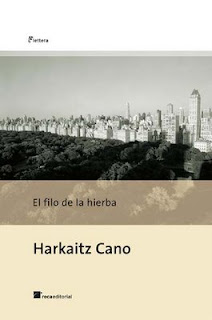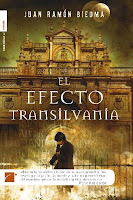I'm very happy to announce the deal for
Greek rights of
Harkaitz Cano's novel
El filo de la hierba (The Edge of Grass), which will be published in Greece by
Konidaris Publications.
The novel (123pp.) is published in
Basque and in
Spanish (Lettera/RocaEditorial).
Despite his youth,
Harkaitz Cano (b. 1975) is consolidated as one of the best contemporary Basque writers. His mixture of modernism, poetical insight and an accurate narrative rhythm comes at equal parts from the classics of literature, the comics, the cinema and the music. His works, with echoes of
Raymond Carver and
Paul Auster, have received important awards such as the
2005 Critics Award (for his collection of short stories Neguzko zirkua –Winter Circus). His last published novel, El filo de la hierba (The Edge of Grass) has received the
Euskadi Award for Literature. It is a Modernist fable set in New York with Adolf Hitler and Charles Chaplin as main characters.
The hipothesis of the Nazis invading the USA is nothing new in literature and it has fascinated authors such as
Philip Roth in
The Conspiracy Against America or, even before him,
Philip K. Dick in his masterpiece
The Man in the High Castle. Harkaitz Cano departs from this premise to build a short and poignant allegoric story about freedom.

The novel begins with
Hitler on board of a German battleship en route to New York. Far away from dying in his bunker in 1945, the Führer has won World War II. After the conquest of Europe, his next objective is New York, and afterwards America. The British actor and filmmaker
Charles Chaplin, tortured and as a prisoner of the Führer, is also a passenger of that ship. He is a victim of Hitler’s rage in revenge for his film The Great Dictator.
Many years before, in 1886, a Frenchman called Olivier Legrand travelled as a stowaway in the same ship that transported the Statue of Liberty from France to New York. The statue, of 225 tons of weight, was made out of 300 pieces that were packed in more than 200 cases. The only piece that wasn’t packed in a case was the crown of the Statue, inside of which Olivier hid during the four weeks of the journey through the Atlantic ocean.
El filo de la hierba interlocks between the lives of Chaplin and Legrand until they both meet each other in a New York occupied by the Nazis (Chaplin had managed to escape from Hitler's vessel but is severily ill) and the old Frenchman, who is now almost 90 years old, decides to hide Chaplin in his small appartment, where the actor will slowly recover. From this moment on, with Wagner’s music sounding all over the city and with Hitler trying to take control over Hollywood, the reader will be kept on tenterhooks until the end of the novel.
As the title suggests, this short novel is just like the flexible and soft grass, which edge is sharp as a knife.
Translation rights (except Greek) are available. Contact: bernat@salmaialit.com
 Intersecting fantasy, thriller and horror, Biedma transforms Seville, the book’s setting, into a surrealistic parallel of itself to tell us about schizophrenia.
Intersecting fantasy, thriller and horror, Biedma transforms Seville, the book’s setting, into a surrealistic parallel of itself to tell us about schizophrenia.